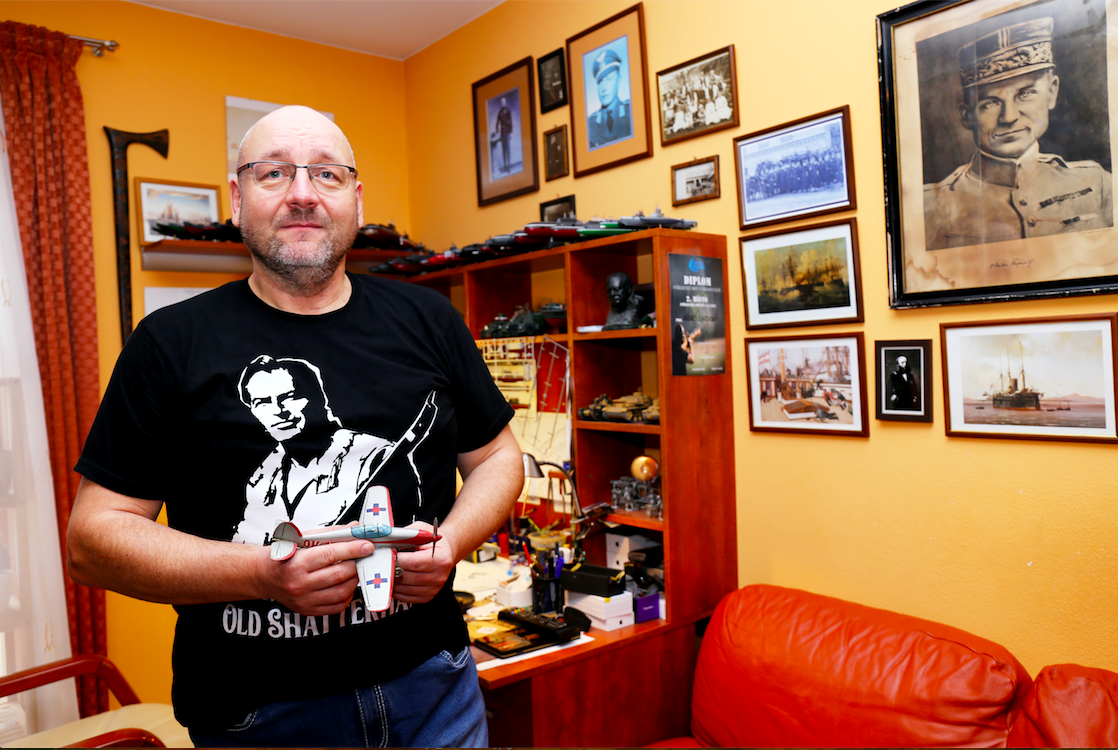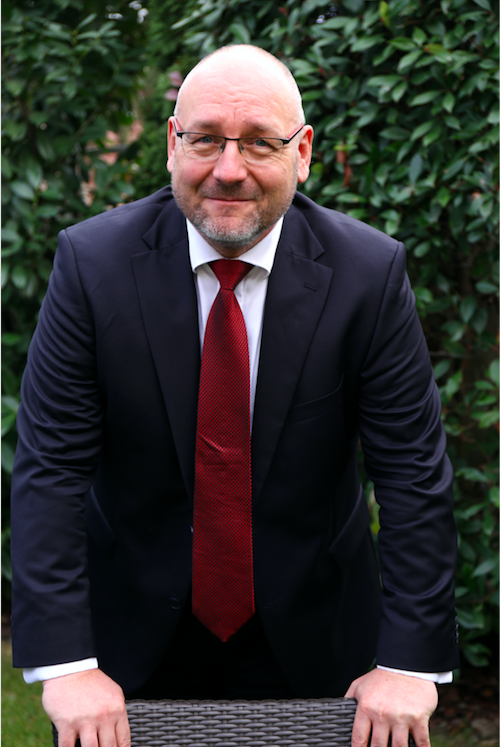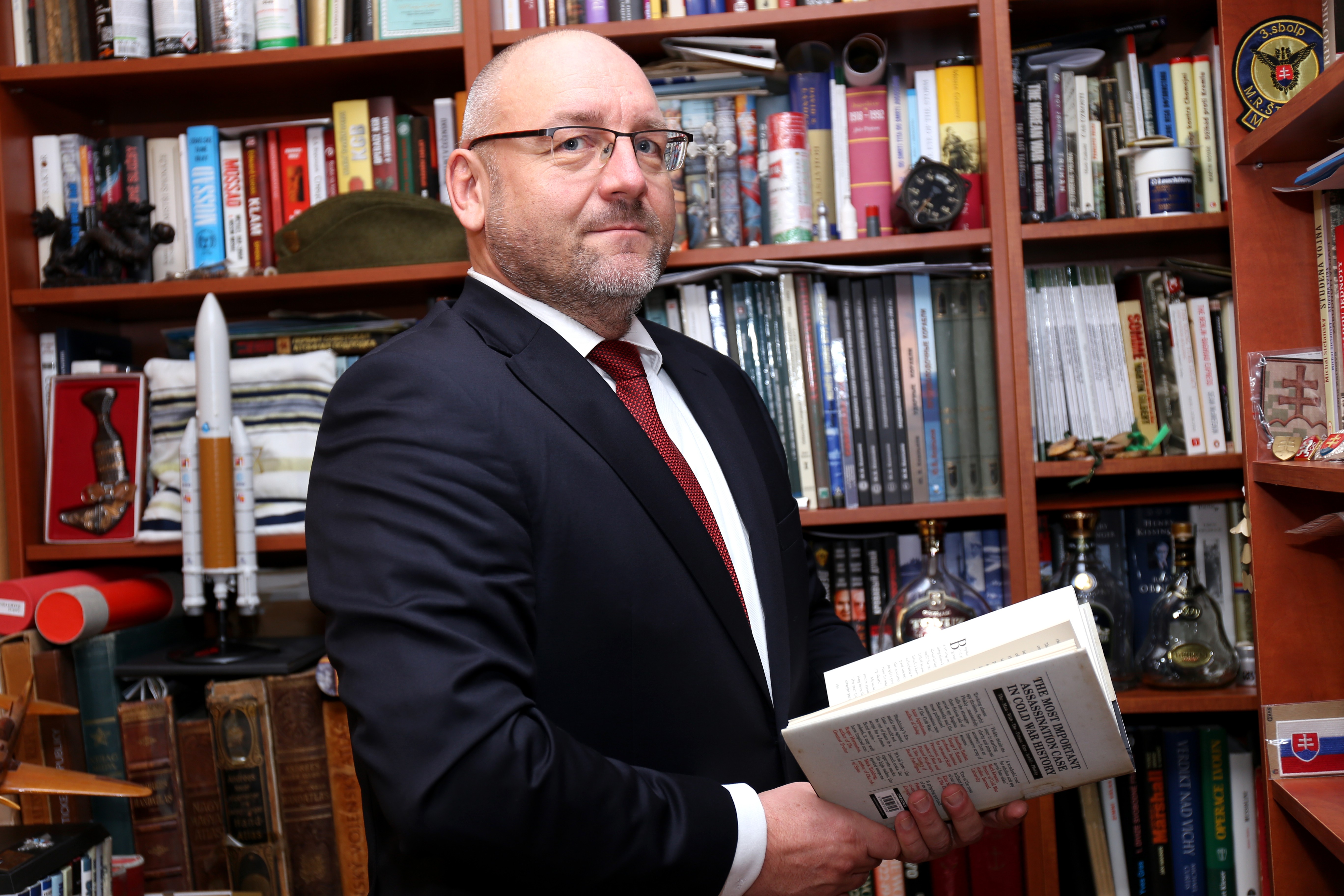14.11.2022 Наши люди
Director of Development and International Projects Andrej Žiarovský confirms leadership qualities in a profile interview: At VUJE, our top experts know that it is necessary to progress
He has been involved in military and naval history for years. He is the co-author of the monograph Battle of the Strait of Otranto, a biographical study of Prince Johannes von Liechtenstein and the author of the recently published book Russian Century of Wars: Victories and Defeats from Stalin to Putin. The rules of strategies and historical contexts are loaded and encoded in his DNA, supported by a unique family history. And he notes that nuclear energy is on the verge of a new renaissance. Ing. ANDREJ ŽIAROVSKÝ, MBA, is a new member of the top management of VUJE, a. s., Director of Development and International projects. We talked to him about the status of nuclear power in Europe and his journey to embracing nuclear energy.

The European Commission approved the inclusion of nuclear power and gas in the so-called taxonomy, i.e. among clean, climate-friendly energy sources. How is it evaluated at the world energy leaders international forums?
First of all, it sends a very strong signal towards the financial and banking world indicating that the nuclear energy's "age of exile" is over and the nuclear industry is a suitable sector for investment even from the sustainable development point of view. It is worth noting that this very signal is the reason for the resistance of some lobbyists representing Renewable Energy Sources (RES) producers. A significant part of the global investment and financial pie of resources will surely be redirected to nuclear energy. It can be assumed that it will be mainly into the implementation of Small Modular Reactors (SMRs) technologies.
It is necessary to constantly emphasize that the radioactive waste issue that is considered to be the nuclear power's weakness, is actually its strength. No other branch of electricity production and industrial activity in general has such a thoroughly and precisely elaborated scheme of safety, processing or disposal of its waste as nuclear energy.
Nuclear energy remains synonymous with technological progress and a stable part of the future energy mix. This is how it sounds in the professional world.
Yes. We can see nuclear energy - even in the light of other events, such as geopolitical turbulence, rising energy prices, the threat of climate change and related ecological aspects - as clearly promising. If we are to maintain the possibility of sustainable development and prosperity in Europe, it simply will not work without nuclear energy.
Let's break it down.
The era of fossil fuels is clearly coming to an end. Coal is toxic in terms of carbon footprint, natural gas brings unacceptable geopolitical risks, and oil reserves will not last long. Although hydropower is an acceptable and accepted source, the possibilities of its capacity growth are significantly limited here in Europe - albeit to a lesser extent than other renewable sources, but still largely dependent on weather and climatic conditions.
Therefore, energy from nuclear remains the only real and permanently available energy and its production is not limited either by the availability of the primary source (uranium) nor by dependence on the weather or climatic situation. Today's challenge thus becomes the symbiosis of nuclear power and weather-dependent renewable sources.
What is your work goal?
VUJE is a leader in the nuclear safety field, commissioning and decommissioning of nuclear facilities with VVER technology. In the near future the company´s strategic aim is to use our skills and know-how even beyond the boundaries of VVER technology, and not forgetting the dramatically developing market of Small Modular reactors (SMR).
Are we ready for the introduction of new technologies in Europe as it is in the United States of America?
The United States of America is undoubtedly further along in the strategic planning of its future energy mix than we are currently in the European Union, but even there the process has not yet reached its final stage. However, we can certainly get inspired by our American colleagues´ intention to distribute the construction of new sources between RES, traditional "large" reactors and emerging SMRs.
The declared strategic goal of the EU is the basic distribution of the energy mix in the ratio of 80% RES versus 15% nuclear power (5% remaining for other sources). This approach will undoubtedly generate great demands on electrical network regulation systems, but on the other hand, it may be the impulse that will accelerate the development and implementation of a new generation of nuclear power equipment.
You are the newest member of the top management, the director of development and international projects of VUJE, a company that is known by high standards in its personnel policy. Is it a challenge?
I accept challenges willingly from the beginning, and not just in my professional career. This is probably due to the fact that I am from the generation that entered the work process shortly after the Velvet Revolution, when young people were opening up possibilities that had not been imagined before. No seniority was required (smile) and thanks to that I was at one point the youngest general director of the administration/section of civil aviation, the so-called DGCA, in the world.
Working for such a renowned company as VUJE is a challenge itself. I have experience of working in corporate structures and in private companies. After the first months of work "on Okružná in Trnava", I dare to say that VUJE, as a company with a very wide portfolio of activities and doing business in such a sophisticated field as nuclear power is, pragmatically maintains the precision and process structure inherent in the corporate style of management due to its corporate culture , but at the same time, thanks to its private ownership structure, it maintains high activity and flexibility in decision-making processes.
What was your journey to energy like? You started studying at the Naval Academy. Were the turbines the common denominator?
Yes, you could say that. I started my university studies at the Naval Institute in Odessa and today's Saint Petersburg. In the meantime, the Velvet Revolution came, and one of the first victims of the unfortunately implemented privatization was the Czechoslovak Ocean shipping, and shortly after that, the Komárno shipyard, where I wanted to work after my studies. After returning to Czechoslovakia, which still existed for a few months at the time, I continued my studies at the Faculty of Mechanical Engineering at the Slovak Technical University. The fact that ship propulsion units as well as aircraft jet engines and "land" power plants have one common feature really played a big role in choosing my field of study. They are the turbines that I was very interested in.
After graduating from the department of thermal energy, I worked in civil aviation for the first 8 years of my career. During my military service in our air force, I still had time to graduate from the school for reserve officers. then did I settle in energy. I went through senior managerial positions in the corporate structures of ČEZ, Enel and Alstom.
Andrej Žiarovský has more than 2500 books in his study. They are mostly in English, Czech, Russian, German and even a few Polish originals, since not much historical and technical literature is published in Slovak. The new director of VUJE, a. s., for development and international projects is also the co-author and author of three.
According to your articles and books, military history and aviation are all related to family genes.
Sometimes, looking with perspective, I say that the history of our family didn't just flow by, but that my ancestors had to experience it firsthand (smile). My Great-great-grandfather and two Great-grandfathers fought on the Russian and Italian fronts during the First World War. Great-grandfather Juraj was a "scharfschütze" (predecessors of today's snipers) and survived a cruel series of winter battles in the Carpathians, the Gorlice-Tarnów offensive and the Brusilov offensive, which became fatal for one of his cousins.
During the Slovak National Uprising, my grandfather found himself right in the center of the action, at the main rebel air base, Tri Duby. My family comes from the village of Župkov, in the Kľakovská valley, which after the suppression of the Uprising became the operational area of several partisan groups. On Sunday, January 21, 1945, German Einsatzkommando 14 belonging to Abwehrgruppe Edelweiss raided the valley. All four villages located in the valley were burned to the ground and men from the villages of Kľak and Ostrý Grúň were brutally shot by the Nazis. My grandfather and great-grandfather almost miraculously managed to escape from the valley under fire. Fortunately, the grandfather had a bad feeling a few weeks before the tragic events and wisely sent the grandmother and great-grandmother to relatives in the nearby Nova Bana.
In August 1968, the father was a soldier with the 33rd anti-tank brigade in Lešany and on the critical night he was the guard commander of the military ammunition depot. The 33rd brigade was one of only two higher units of the Czechoslovak army, which, thanks to the decisive action of its commander, the Soviet army failed to occupy and disarm.
I grew up listening to stories about the Uprising, both world wars, the so-called collectivization in the fifties and the events of 1968. I have been actively interested in history since I was 12 years old. My childhood heroes were Admiral Horatio Nelson, sailors Francis Drake and Fernando Queiros, or the only naval captain of Slovak nationality in the ranks of the Austro-Hungarian fleet, Július Juraj Thurzo. So I gradually worked my way up to the history of the 19th and 20th centuries. And I´ve stayed with that.

The plane, a memory of Andrej Žiarovský's grandfather Ján, the fifth bearer of this name in the Žiarovský family, is a symbol of family history. During the SNP, Ján Žiarovský was right in the centre of the action, at the main rebel air base Tri Duby. Apart from the portrait of M.R. Štefánik, there are mainly family historical pictures on the walls of the study.
A historical overview is a big asset in networking, too. As much as we all value speaking in our national language, we value knowledge of our countries' history even more.
Yes, that is very true indeed. Foreign partners can appreciate when I talk to them about their own history. I see it with our French and German colleagues for example. Even not that long ago a knowledge of history helped me enormously to break the ice during negotiations in the countries of the former Soviet Union. It happens that I am able to introduce my partners to events of their own history that they did not know about until then.
For example, my naval background and love of naval history helped me a lot recently in establishing a friendly relationship with an influential and respected nuclear energy expert who was a former senior officer in the US Navy and served as commander of the reactor section on the Sturgeon-class nuclear submarines.
In addition to Slovakia and the Czech Republic, which countries does VUJE consider as a territory for its activity development?
Neighboring countries where VVER nuclear reactors operate come first, of course. Our closest stable partners are therefore the Czech Republic, Hungary and Ukraine. As I have already mentioned, we are going to take steps forward towards expanding our activities to France, Germany and Italy where we already cooperate or we are preparing the ground for cooperation.
Countries that aspire to join the nuclear club, such as Poland, are a very important object of our interest.
For me, however, the most interesting and very gratifying finding is that most countries are once again recognising the necessity of nuclear technology and are already starting to implement it in their energy plans.
I therefore believe that we are on the right track.





